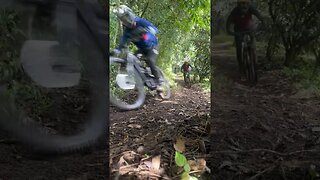Cannondale Jekyll 1 Long Term Review - High Pivot Mountain Bike Test
The Full Review: https://theloamwolf.com/2022/04/06/review-cannondale-jekyll-1-29/
The Giveaway Survery: https://theloamwolf.com/2022/04/06/cannondale-jekyll-giveaway/
After months of testing on a variety of trails and conditions, we've formulated a strong opinion of the new 2022 Cannondale Jekyll high pivot enduro bike and where it excels. If you'd like to learn more about this mountain bike and check out the review with Cannondale staff, engineering team, and read our in-depth review, please visit theloamwolf.com
THE DIRT
If you read our “First Impressions of the Cannondale Jekyll 1” at the end of our Dissected Feature then you’ll recall we were impressed and looking forward to lots more miles aboard this enduro-ready mountain bike. Compared to other high pivot bikes like the recently reviewed Norco Range and GT Force, the Cannondale Jekyll is a strong contender. In some areas we’d say it’s better than the rest and then in others it’s not our favorite. Hopefully what you can take away from the following is what parts of the performance are most important to you and which areas you’re willing to compromise.
Climbing any of the high pivot bikes in our fleet requires some extra effort, and there’s no denying that they’re slower up the hill. At 35.5 pounds, it’s a few pounds lighter than the Range and arguably has a smoother feel while pedaling. It’s close in weight to the GT Force and climbs nearly as well. So, for a high pivot bike we’d say it’s average, which means for non-high pivot bikes it may be comparably sluggish.
On flatter, less challenging trails the Jekyll feels livelier than some rigs like the Range, but not quite as spritely as the Trek, YT or Canyon enduro offerings. It still moves around well and is far from cumbersome in the grand scheme of things, but you should be aware that Cannondale made this bike to navigate a specific type of terrain. If you’re not regularly charging that type of terrain, a shorter travel option is likely a better call.
We were quite surprised at how the Cannondale Jekyll performed on flow trails and jump trails. Pleasantly so. Yes, it has a lengthening wheelbase, albeit not as drastic as others, which can still be an issue for snaking tight berms at high speeds where you want to press and pop in and out of corners. However, on longer turns and bigger lips, the Jekyll did a very good job of maintaining speed and popping off the ground. It’s stable enough to inspire confidence, yet can also be whipped and moved, and made for some very fun play laps on our favorite jump lines. To put it shortly, the Jekyll is probably the best jumping high pivot bike we’ve ridden to date.
Once it came time to put this enduro bike in enduro terrain, it got even better. The Cannondale Jekyll is extremely comfortable at high speeds and while in a standing, attack position. All of our testers remarked on how quickly they felt comfortable aboard the Jekyll 1. When the trail pointed downhill, its ability to get up to speed and hold it wide open was impressive, especially when you factor in its reasonable agility on slower and tighter terrain. The mid-high pivot seems to be this crew’s favorite, as it doesn’t have quite as drastic compromises from the excessively growing rear end lengths, but still offers some of the benefits of a rearward axle path when it comes to tackling the chop.
If you’re a rider who’s regularly looking for speed on the trail but wants something with pleasant handling characteristics outside of the tape, the Jekyll could be a great machine for you. This mountain bike does a very good job of taking the sting off the big hits and smaller chatter and lets you look further down the trail with confidence. It’s a composed ride that offers stability and loves to rail bigger corners and float over chunder.
The spec on the Jekyll 1 was problem free as a whole, but that’s not to say it’s a perfect bike. The choice to spec EXO+ tires must have been driven by the overall bike weight figure, as they’re certainly not what we’d choose to spec for enduro racing. The shock cavity makes adjustment difficult and adds an extra step, as well as making it more difficult to clean after a sloppy ride. Otherwise, the bike ran relatively quiet aside from some minor idler “whirring” when the chain became a little dirty, and we had no issues or complaints with the remainder of the spec. The value proposition, at $6100 for this build tested, seems reasonable, if not mind-blowing.
This is just a snippet of the written review, read the rest of it on the site:
https://theloamwolf.com/2022/04/06/review-cannondale-jekyll-1-29/
Chapters
Intro - 0:00 - 2:00
Tech: 2:01- 6:04
Impressions: 6:05 - 12:21
Outro: 12:22 - 12:54
Get your Loam Wolf gear here:
https://store.theloamwolf.com
------------------------------------
FOLLOW US
Website: https://www.theloamwolf.com/
Instagram: https://www.instagram.com/theloamwolf/
Facebook: https://www.facebook.com/theloamwolf
-
 0:27
0:27
The Loam Wolf MTB Reviews & Features
7 months agoSweet singletrack through the Guatemalan jungle. Warm up laps.
91 -
 LIVE
LIVE
Akademiks
4 hours agoFoolio Murder about to be Solved?? Yungeen Ace RICO otw? Gunna vs Thug. Sexy Redd vs King von sis
5,346 watching -
 LIVE
LIVE
The Late Kick with Josh Pate
49 minutes agoLate Kick Live Ep 525: CFB's Best Rivalries | Kirby Treatment | EASports CFB Ratings | SEC Overrated
122 watching -
 10:40
10:40
Paul Joseph Watson
2 hours agoIs the Debate Rigged?
1.56K28 -
 LIVE
LIVE
WeAreChange
1 hour agoCNN SUCKS Presidential Debate: Joe Biden vs Donald Trump w/ Roger Stone In Studio
1,078 watching -
 LIVE
LIVE
Drew Hernandez
3 hours agoWATCH PARTY: TRUMP VS BIDEN 2024 DEBATE
632 watching -
 LIVE
LIVE
Melonie Mac
1 hour agoGo Boom Live Ep 10: Dr Disrespect Drama, New Tomb Raider Game, and More!!
598 watching -
 39:20
39:20
The Lou Holtz Show
1 hour agoRiley Gaines Speaks Out on Fairness in Women's Sports | Lou Holtz Podcast #WomensSports
3.8K7 -
 33:49
33:49
Stephen Gardner
3 hours ago🔴BREAKING: Judge Merchan PRESSURED to ARREST TRUMP!
23K34 -
 1:00:59
1:00:59
Kimberly Guilfoyle
7 hours agoOn Their Records, It's No Debate: Trump & Biden Face off in Atlanta, Live with Jeffery Clark & Tim Murtaugh | Ep. 137
41K42